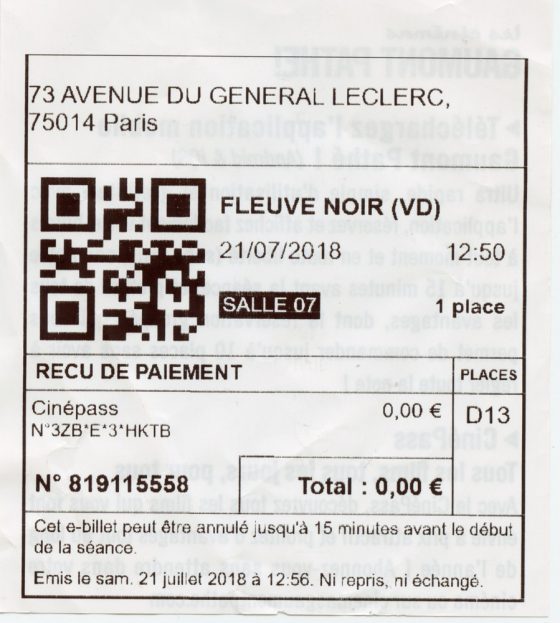Fleuve Noir

Splitting the begged question…with a difference!
I don’t know who or what is behind which films go where, especially after the incompetent on even the most basic technical level The Strange Ones managed to secure distribution in France. Nevertheless, M. Vincent Cassel and M. Romain Duris have what counts as a name outside my native land (technically, I’m Breton now. Always gets a laugh in Ille-et-Vilaine, but I ain’t gonna try it in Finistère. I don’t want to die).

So you might wind up with Fleuve Noir. I recently saw a badly translated English title (Black Tide) on imdB, and that’s a harbinger of your future doom. To add to the danger that it won’t just stay in its native land and die quietly, it’s crimey, and gritty and has an ending. Which I’ll get to, breaking with tradition, at the end.
To be fair, M. Cassel acquits himself rather well, a drunk cop who really seemed like he would fall off the rails at any moment. Had the shamble down. He (or his performance, if you don’t like M. Cassel, and I thought I didn’t, until I checked and found out that it was M. Kassovitz I didn’t like. All the French look alike to us Breton) deserved better.
Deserved better as Fleuve Noir is an example of splitting the difference between what the audience knows and what they don’t in the worst possible way.
Maybe we've reached that point where we're grasping anywhere we can for a shock. I certainly imagined the filmmakers looking for a pen in a dark room full of exposed wires.
If you imagine a joint from Ms. Maya Deren on one end (knowing nothing) and all three endlessly long on their own but even longer together Episodes 1-3 (knowing everything), narrative cinema, being that it happens over forward moving Newtonian time, is about the reveal. The secret is floating between these two states in a satisfying way.
I tend towards the Leonard side of the Leonard/Esterhaus split, but as bad as the Esterhaus style of setting us up for the whammy is, at least I can tell what’s going on. And Leonard, as much as he tries to let us know as much as we can about the characters and what they want, does not let us know what’s going to happen to them.
In the case of Fleuve Noir, with all of its transparent misdirects, and nonsensical character choices, the film had to choose, and it didn’t: we needed to know either more or less.

It was moderately exciting to go to a new cinema. It allowed for new snacks, as well as the odd space in the Gaumont Alésia – a theatre within a theatre where you can watch trailers. In case the movie you’re about to see hasn’t been spoiled enough.
Example, M. Duris (the only other male actor in France it seems) is sending letters from the dead son to the family. We see this. It turns out that he’s not the killer (the only one who could have the letters), no he’s doing to stir the parents up in order ‘to write a really good novel’.
When this is revealed, and M. Duris is heard to utter ‘L’écriture est ma prison’ (‘Writing is my prison!’) followed by a nice ‘c’est le pouvoir de la littérature’ (‘that’s the power of literature’), the audience gave an ‘awwww, come on’ (‘ahhh….lors!’) groan, making me feel like I actually was getting the translation right.
Audience reaction aside, this could have worked as an moronic motive if we knew about it the whole time, or didn’t know anything about it. Instead, the film wastes our time tricking us into thinking ‘he’s a suspect’. It does this because it’s saving us for…
…the end, where we are now.
Most unfortunately.
So.
To sum up.
The retarded underage child of the couple was having sex with the dad. Did I say she was being raped by the father? I did not. Why? Because the girl in the film, keeping with French tradition, ‘liked it’ [‘elle aime ça’], and thereby it could not have been rape. Nope.
The brother didn’t like the situation (‘il ne l’a supporté plus’) so the mom (or the dad) killed him. Then the mom blackmailed M. Kessel by tricking him into raping her (yep), and then, telling him all of this at the end so he wouldn’t be able to say anything at the trial.
There are so many things wrong with this, but first of all, the mom was the one who came to the police in the first place. If she had just had kept her mouth shut, no one would have known.
Right. And all that rape. Rape is a delicate subject, and given the massively contrived nature of this ending, maybe we’ve reached that point where we’re grasping anywhere we can for a shock. I certainly imagined the filmmakers looking for a pen in a dark room full of exposed wires. It’s basically thrown together nonsense to make M. Cassel feel bad and make the audience go ‘ooh’ (‘ouaoh’).
Now I could have objected to the problematic problematicism of the thing, and instead went for the narrative problems. And I could chastise them for using lotsa rape for cheap bourgeois thrills. But I’m a freedom of speech extremist, so do what you want.
Just don’t suck so much at it.
The Take

Thoughts on Fleuve Noir

 [logo]
[logo]
Sounds like merde on a stick without the stick, fuck the scumbags who make such drivel to further desensitize the masses into accepting it all…
As I tried to make clear with the ‘A-lors’ (now ‘ahh..lors!’), the audience was not buying it. There are no ‘masses’; just a bunch of people doin’ stuff.